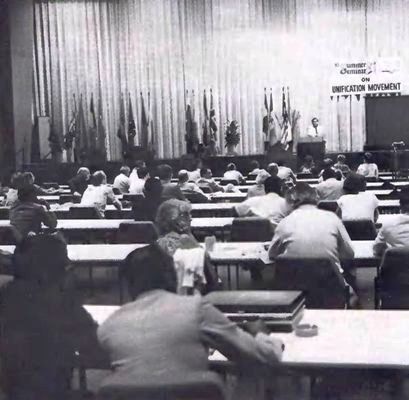![]()
The Words of the Bennekemper Family
|
|
The Words of the Bennekemper Family |

The third annual summer seminar on Unification Theology drew over 250 people to the Canary Islands August 1-9. Convened by Dr. M. Darrol Bryant and Dr. Richard Quebedeaux, and coordinated by John Maniatis, the seminar was sponsored by the New Ecumenical Research Association (New ERA).
In addition to the usual introductory seminar, an advanced seminar was offered for those who have been attending Unification conferences for some time. More than 140 theologians, scholars of religion and ministers, many accompanied by their spouses, attended the introductory seminar. Twenty-five participated in the advanced seminar, which was moderated by Dr. Frederick Sontag.
Welcoming the guests, David S.C. Kim urged them to investigate the Unification movement and draw their own conclusions, and invited constructive critiques of both the Principle and the movement. He also described our efforts to promote "academic ecumenism" through open dialogue.
Lectures on the contents of the Principle, Unification Thought and VOC were followed by open-floor question and answer periods, prepared theological responses, and small group discussions. Lecturers, primarily graduates of our seminary at Barrytown, included Dr. Mose Durst on the Principle of Creation; Jaime Sheeran on the Fall of Man; Frank Kaufmann on the Mission of Jesus; Bill McClellan on Christology; Jim Baughman on Providential History; Neil Salonen on Eschatology; Diana Muxworthy on the Second Coming; and Lloyd Eby on VOC and Unification Thought.
Rather than lectures, the advanced seminar featured papers by non-Unificationist scholars who have been studying Unification Theology for some time, followed by responses. Topic of the papers presented included:
"The Principle of Restoration through Indemnity: A Crucial Question for Christian Theologians"
"New Religions and the Second Naivete"
"The Doctrine of the Trinity in Unificationism"
"Soteriology According to Divine Principle: A Comparative Theological Perspective"
"The Function and Development of Myth in Unification Thought" "Spirituality"
"Theodicy and the Individual: From Job to Divine Principle"
"The Emperor's Old Clothes: A Reexamination of the Biblical Foundations of Messianism"
"Material Wealth and Divine Principle" "God and Human Suffering: A View from Below"
"Unification Theology and the Role of Post-Confucian Asia in the Coming World Civilization"
A collection of these papers will be published later this year.
Unificationists who attended the advanced seminar included several graduates of Barrytown who are pursuing advanced studies: Dagfinn Aslid, Anthony Guerra, Pauline Pilote, Whitney Shiner, Jonathan Wells and Andrew Wilson.
Small group discussions, combining participants in both the advanced and introductory seminars, played a key role and were felt by many to be the best part of the conference. Many more questions and issues were addressed in the smaller sessions than could be accommodated in the limited time for questions and answers after lectures.
Afternoon activities included sightseeing and sports.
In his closing remarks, Rev. Chung Hwan Kwak spoke about Father's prayerful life and character, urging all the guests to participate in God's providential work, especially through understanding, support and objective evaluation of the Unification movement.
One professor pointed out that the all-expense trip could be viewed as a consultants' fee, since participants were asked to be theological consultants to assist Unificationists in developing a more sophisticated expression of their theology. Another participant remarked that "Unification has once again moved the God problem to center stage" and cited his gratitude for the openness of our members.
Still another observed that "perhaps the overriding awareness at the seminar was the sense of having been invited to be an observer and a participant in a unique event in religious history: a new, emerging and quite controversial religious movement inviting theological minds of older religious traditions to criticize and critique their development."
One guest wrote in summary, "Unification is coming of age and deliberately so. Mainline Christianity dare not ignore it. Blind, naive acceptance and aggressive suppression are both dangerous and untenable options. The open dialogue the Unification Church has initiated is both hopeful and promising. Perhaps if we were more sure of our own faith and more ready 'to give a reason for the faith that is in us,' we would not be so frightened by this variant."